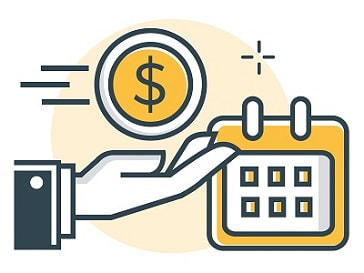What to Do When You Can't Make Payroll
Our guide outlines what happens if you can’t make payroll, ten proven options to make payroll and must-know frequently asked questions and tips to cut the ongoing costs of running a business
Updated 10 May 2023
Missing payroll is detrimental to your business. Your employees are your number one asset. Without them, it's hard to run a successful business unless you're capable of running a one-person show. You hired employees because you needed help, but when you hired them, you did so with the understanding that you'll pay them on time and correctly. If you don't, you could face serious legal consequences, including fines, penalties by the Employment Relations Authority.
In addition, word gets around fast when a business mistreats its employees. New Zealand is a small place and such news could damage your company's reputation and make it difficult to stay in business. But what happens if you can't make payroll? How do you proceed? Our guide makes it clear with proven must-know options to get your staff paid. We outline:
Warning: This guide contains general information and does not constitute financial advice specific to any business; please be aware there is very little funding or assistance for businesses struggling. We publish and update this guide to make business owners aware of options to help them pay staff without putting their business in more financial difficulty.
Missing payroll is detrimental to your business. Your employees are your number one asset. Without them, it's hard to run a successful business unless you're capable of running a one-person show. You hired employees because you needed help, but when you hired them, you did so with the understanding that you'll pay them on time and correctly. If you don't, you could face serious legal consequences, including fines, penalties by the Employment Relations Authority.
In addition, word gets around fast when a business mistreats its employees. New Zealand is a small place and such news could damage your company's reputation and make it difficult to stay in business. But what happens if you can't make payroll? How do you proceed? Our guide makes it clear with proven must-know options to get your staff paid. We outline:
- What Happens if You Can’t Make Payroll?
- What To Do When You Can’t Make Payroll – 10 Proven Options
- Frequently Asked Questions
- Proven Ways to Cut the Costs of Running a Business
Warning: This guide contains general information and does not constitute financial advice specific to any business; please be aware there is very little funding or assistance for businesses struggling. We publish and update this guide to make business owners aware of options to help them pay staff without putting their business in more financial difficulty.
Know This: What Happens if You Can’t Make Payroll?
If you can't make payroll, it could land you in legal trouble and make your financial troubles even worse.
But if you can't pay for whatever reason, what are you to do? Here's our suggested approach:
But if you can't pay for whatever reason, what are you to do? Here's our suggested approach:
- Notify your employees immediately. Don't ignore the issue and tell them minutes before they're supposed to receive their payments. Instead, be honest with them and tell them what you're doing to remedy the situation. They can then make provisions to prepare for a missed payday.
- Look for an alternative method to make payroll – we list ten proven options below to give you some ideas.
- Communicate with your creditors if any essential services are overdue. We outline a suggested process below to help you slow down payments to suppliers that will keep your business running while protecting stakeholders (you, the employees and the creditors).
- Monitor for signs that you can't make payroll going forward – you will be better prepared (and have more options) if you anticipate a cash crunch in the future.
How to Anticipate if you Can't Make Payroll:
While you never want to be in a situation that you can't make payroll, there are signs that it may happen. Here are some common indications you may experience payroll issues shortly:
- You're waiting for a late payment from a customer, and without the funds, you will have a hard time keeping up with your bills.
- Your bank account is running low, and you're wondering how you'll make ends meet.
- Your forecasted cash flow doesn't equal your actual cash flow.
- Your accounts receivable outweigh your sales volume.
What To Do When You Can’t Make Payroll – 10 Proven Options
We've put together a proven list of options to help improve your day to day finances. If you find that you can't make payroll, the options below are available:
Use a business credit card to make payroll (if you have available balance, payments are instant)It's slightly unconventional, but for a 2% charge, it can be done. However, how much you can use for payroll depends on the credit limit. For this reason, the option is most suitable for a small business where payroll is less than $10,000 (and there's a business credit card with a limit that can absorb the cost).
How it works:
Jenny, a small business owner and MoneyHub user, explains: "I use a lot of freelances for my design business, so I always have invoices hitting my inbox. I made a decision before COVID-19 to pay them with my business credit card. I can set up each contractor in Wise in seconds which makes recurring payments faster. I may spend $5,000 to $20,000 a month on contractors and am happy to pay the 2% fee to use my work card. The payments sync with Xero, and I earn points on my card. While I have good cash flow (from happy and fast-paying clients), I will always use my card to make freelancer payments as the notifications they receive are transparent and timely. |
Apply for a short-term business loan (to use for working capital such as payroll and urgent suppliers)While you don't want to pay interest, if it's your only option, a short-term business loan can provide the financing you need. Applying for a small business loan to get you through these hard times may help keep your business afloat and help you pay your employees and not lose your business.
Know This: Business lending, in our view, is a fractured product in New Zealand and banks are cautious about lending to businesses, despite government grants in the past, which compounds cashflow issues. Our business loans guide explains your options, and what you should expect to pay, and the best lending offers available. Important: While business loan interest costs will often be above any mortgage rate, it's important to manage your cash flow while you repay the loan. Some business owners rush to repay their business loan only to find themselves short of cash again and needing another loan. When this happens, it's expensive as you have to pay loan application costs, and your interest rate may be higher as your business is seen as a higher risk. Alternative Option: Apply for a line of credit
|
Ask any vendors you owe money for an extended repayment period (to direct cash to staff as a priority)We don't suggest you treat vendors like an overdraft account, but managing your creditors with honesty and transparency is easier than avoiding their statement reminders and calls. The first option is to select your three to five largest creditors and give them a call, explaining payment will come when your business is paid by its customers and give an estimated date.
Mike, a MoneyHub reader (and business owner), explains more: "We run Xero and often receive responses to overdue invoices reminders from our customers telling us they're waiting to be paid themselves. I always appreciate the honesty, and it helps us manage cash flow if the account is significant. We work with hundreds of customers, but one or two late payments can hit us badly. The more honest a customer is with late payments, the more we're happy to continue supplying our service. It's when customers are late and then vanish or ignore us that we put them on credit control". Our View: It's a lot less damaging to pay a vendor late than it is to pay employees late. While no business wants a reputation for sluggish payment, if it's the difference between some follow-ups and losing your business and staff, it's almost certainly best to deal with late fees and payment arrangements until your cash flow improves. |
Re-launch accounts receivable processes (to collect cash faster and pay staff on time)If you have a lot of outstanding payments, there are many ways to speed up collection. Our guide to getting debtors to pay overdue invoices offers a comprehensive method of qualifying customers, chasing payment and getting serious when things aren't progressing. An efficient accounts receivable department is your best way to help you get the payments in faster, especially if there is a large number of past-due bills. Our guide reveals what you need to do to make it happen.
|
Offer incentives for new customers (to speed up cash collection and save on resources)As you bring in new customers, offer an incentive for them to pay their bill upon receipt rather than waiting the standard 30-60 days. This will increase your cash flow and help you make payroll on time. For example, you can offer a 5% 10-day payment discount – this may seem like a cut on your margins and may not be suitable for some businesses, but a 5% margin reduction can avoid a lot of chasing time later on.
Some electricity companies offer such discounts to avoid chasing late power bills; discounts are easy to reconcile in your accounting system and keep customers loyal. |
Sell equipment you don't need (and redeploy the cash into payroll)If you need immediate working capital and find yourself scrambling with no options to take out a loan or line of credit, stop and take inventory. Unused equipment, tools, materials and other items can be converted into cash quickly.
Do you have equipment you can sell? Many businesses buy used equipment, and it may provide the capital you need to cover your payroll. |
Use your business's credit card to make cash payments (to take care of everything urgent)We don't normally encourage the use of your credit card, but if you can't afford payroll and need to pay expenses in cash, using the credit card to make ends meet may be your only option. Taking a cash advance will give you the funds to cover payroll, but just make sure you can cover the credit card bill and don't dig yourself into a deeper hole. Credit card interest is expensive, but 20% p.a. is 'only' 1.60% if you repay what you withdraw/spend within 30 days.
|
Liquidate excessive inventoryIf your business has inventory, do a stocktake. Do you have more than you need? Since you're trying to save your business right now, the best thing you can do is liquidate inventory with a flash sale, pay your employees and worry about building inventory back up when you can.
Your focus right now is the present. Don't worry about future sales because without covering payroll, you won't be in business to make future sales. |
Use personal financesMixing business and personal finances is never a good idea, but if you can't make payroll, it's like a life or death situation. You can use your personal finances to cover the situation, for the time being, paying yourself back when you get back on your feet. Director loans to a business are very normal and you can be repaid on terms that suit the cash flows of your business.
|
Ask friends and familyIt's high risk (in terms of destroying relationships) and it's an uncomfortable question, but help from family and friends you'd do the same if you couldn't pay your house payment, right? If you want to keep your business in place, ask your friends and family about a potential loan to get you through the tough times. Work out a payment arrangement so you pay them back and make sure everyone is on the same page.
|
Frequently Asked Questions
What happens if you can make payroll?
It's not a good situation to put yourself in. Most employers who can't make payroll end up with serious fines and violations from the Ministry of Business. It could put you out of business, and even if it doesn't, it will likely ruin your reputation.
What if I can’t afford payroll?
It's a bad situation to be in, but you have to exhaust all resources. Get creative and find a way to pay your employees above all else. While making rent and paying your utility bills keeps you in your physical space, without employees, you don't' have a business, and you'll have legal troubles on your hands.
What’s the best tactic to use if you can’t make payroll?
There's no right or wrong way to cover payroll when you don't have the funds. Try looking at options that don't require you to pay interest first to save yourself some money, but if a loan or line of credit is your only option, choose it and pay it off as quickly as you can.
How can you prevent payroll shortages in the future?
It's not something anyone expects to happen, but if it happens to you once, it could happen again. This time, prepare yourself for such a situation and reassess where you spend your money.
Ask yourself:
Knowing why the problem happened can help you figure out how to prevent it in the future.
Ask yourself:
- Am I paying too many salaries? Should you cut back on employees?
- Are your bills too high? Can you cut back somewhere?
- Are you not doing enough business?
Knowing why the problem happened can help you figure out how to prevent it in the future.
Can your investors help if you can’t make payroll?
It never hurts to ask your investors if you can't make payroll. You never know when they may have a solution or even' gift' you money for the time being just to keep you in business.
Proven Ways to Cut the Costs of Running a Business
It's easy to eliminate or reduce a whole range of non-essential expenses your customers don't see or need, as well as boost your balance sheet and drive more sales to bolster your working capital. Our guide has proven tips, such as:
- Lower Overdraft Costs, Consider a Business Credit Card and Get Better Lending Terms
- Challenge Your Advertising ROI (Print and Digital) and Eliminate What Doesn't Work
- Re-Negotiate Building Lease/Rental Costs, Phone Plans and Internet
- Audit Your Expenses and Cut Back
- Book Less (Internal) Meetings to Boost Productivity and Sales















